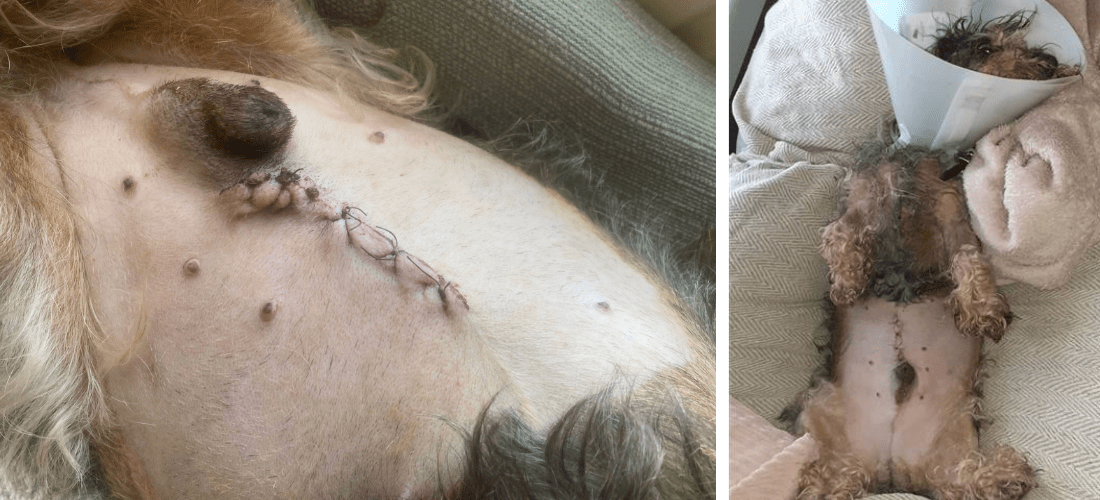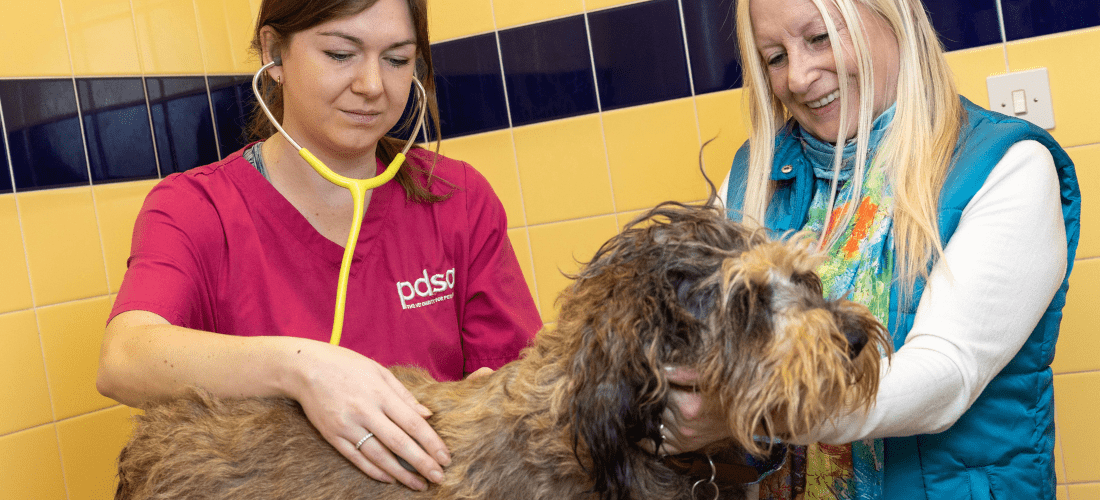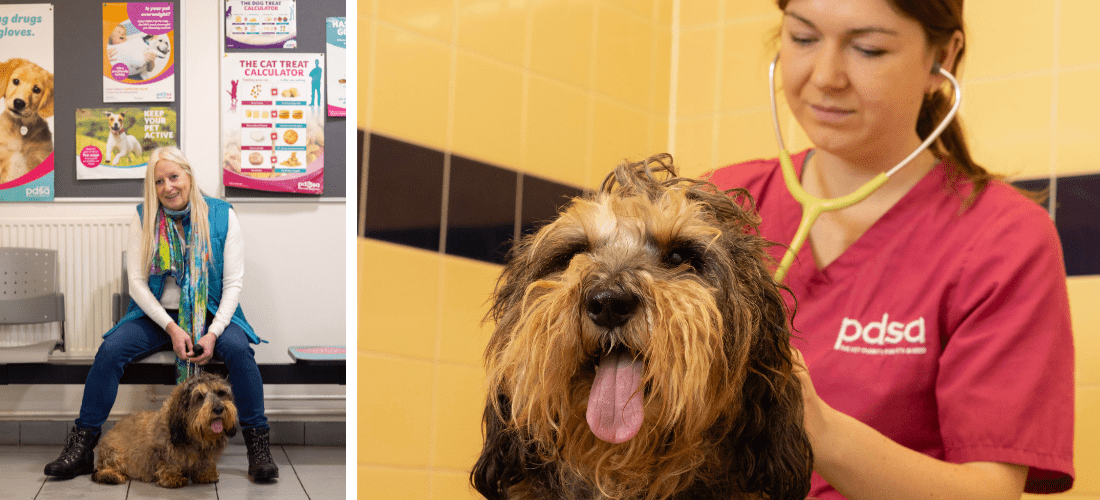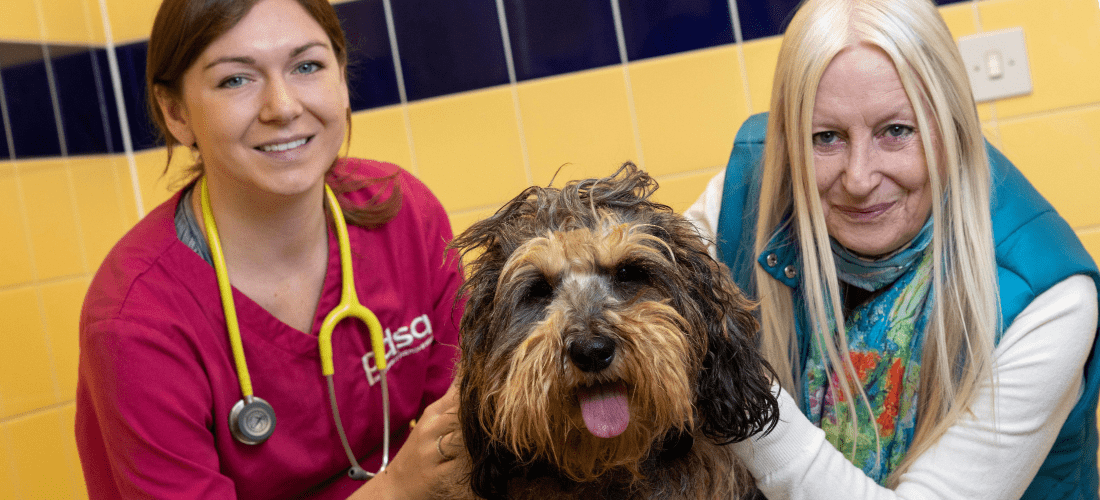PDSA vets saved eight-year-old Gus’s life after he collapsed from bladder stones.
When eight-year-old Miniature Dachshund Gus was diagnosed with bladder stones, his devastated owner, Julie (61, a preschool teacher), thought she was about to lose a precious family pet for the second time.
She explained: “We sadly lost our other Miniature Dachshund when she was eight years old, which caused a lot of heartache. After her death, we welcomed a new Miniature Dachshund puppy, Gus, to the family. Gus helped us in our grief and brought so much joy with his funny antics. Eight years on, he continues to make us all laugh and smile every day.”
It was a sudden, alarming change in Gus one day that prompted Julie to contact her local vets for emergency help.
She said: “Gus was fine until he wasn’t. He was stretched out in an odd position in the garden – like he had collapsed. It was pouring with rain, so we encouraged him to come inside, but he became very aggressive which is so out of character. We were so shocked and knew straightaway something was wrong for him to react this way; he’s the happiest, most affectionate dog.”
Concerned about Gus, Julie made an emergency out-of-hours appointment (as it was the weekend) to see a local vet, who soon identified the problem.
She continued: “My son, my daughter and I took him to a local vet who confirmed Gus was indeed very seriously ill. They found a large quantity of stones inside his bladder and said he would need a complex operation. We were absolutely distraught – all three of us sobbing in the waiting room. And, with Gus being eight years old, it brought back all the sad memories of our previous loss, which only made things worse.”
Bladder stones are rock-like formations of minerals that can develop in the bladder. It’s a potentially life-threatening condition, as the stones can block the urinary tract and prevent a pet from peeing at all. Common symptoms include straining to pee, peeing in small amounts, or blood in the pee. Bladder stones can be extremely painful and can make some dogs, like Gus, feel very distressed or irritable.

At the private vets, Gus received pain relief and had a urinary catheter placed to drain his bladder under sedation. However, Gus’ ordeal was far from over.
Julie said: “After draining Gus’ bladder, the vet discussed costs and said his treatment could exceed thousands of pounds. We were completely heartbroken, knowing we didn’t have any insurance cover or the money to afford it.
“The vet left the room and returned with a vet nurse who knew all about PDSA’s charitable vet service. She called them on our behalf to see if they would accept Gus for further treatment because I’m on a low income and receive housing benefits. PDSA’s receptionist asked if we could bring him to our local Pet Hospital straightaway. At that moment, our tears of despair turned into tears of hope and joy.”
At Thamesmead PDSA Pet Hospital, the vet team immediately examined Gus.

Vet Surgeon Jess Polyblank said: “Despite the treatment he’d already received, Gus was still unable to pee, so we admitted him for further investigations under sedation and gave him additional pain relief to relieve his discomfort. As he was showing signs of dehydration, we also placed him on a fluid drip. An X-ray and ultrasound of Gus’ bladder confirmed he had several bladder stones, which would need urgent treatment – without it, Gus would likely lose his life.”
PDSA vets successfully inserted a urinary catheter to release the trapped urine from Gus’ bladder. That night, he stayed at the Pet Hospital for close monitoring.
The next day, Gus was able to pee, so he was discharged with further pain relief, and his surgery was scheduled for the stones to be removed from his bladder as soon as possible.
Unfortunately, whilst at home, Gus’s symptoms came back, so he returned to the Pet Hospital. PDSA vets anaesthetised Gus and operated to remove the stones from his bladder. The stones were then sent off to a lab for analysis; knowing the stone type was important to help the vet team work out exactly what follow-up treatment Gus needed to prevent more stones from forming in future.

The laboratory report showed the bladder stones were of a type called ‘cystine’, which form due to a rare and inherited disorder that Dachshunds – like Gus – can be prone to. Cystine is produced when the body breaks down protein, which is normally processed by the kidneys. Pets suffering from this condition lose the ability to process cystine properly.
PDSA vets prescribed Gus further medication, including pain relief and a prescription diet to prevent new ones from forming. Unfortunately, cystine stones often come back despite treatment, so Julie needed to keep a close eye on Gus at home. Gus was also booked in for castration to help with managing his condition (as cystine stones can be more common with male hormones present).
Today, Julie continues to work closely with the vet team to ensure that Gus’ condition is monitored closely and that he receives the treatment he needs should symptoms reappear.

Julie said: “His special diet has helped a lot, and Gus is back to his old self – happy, affectionate, and loving his walkies! The journey has no doubt been a long one, but we’ve been supported every step of the way by the kind and knowledgeable PDSA staff. They’ve been such a lifeline to me and my family. Without their services, we would surely have lost our beloved Gus because there’s no way we could’ve afforded his treatment – I don’t have any savings.
“Thank you PDSA for saving Gus and all the kindness you showed me and my family. We will never forget it.”
Total cost of Gus’ treatment to date (October 2024): £2,482.02

PDSA is the UK’s leading veterinary charity. Through our 49 Pet Hospitals and Pet Care scheme, we save the lives of poorly pets who would otherwise be left untreated.
Every year, we treat over 430,000 pets. Without us, emergency cases like Gus' would be left untreated and many pets could lose their lives or be separated from families who love them.
We wouldn’t be here for dogs like Gus without your support. Please consider donating today.


Keep pets like Gus together with their owners
As many families like Gus' struggle to pay unexpected vet bills, they need our urgent support to provide their pets with life-saving treatment before it’s too late.
save Gus' life?
Every £1 donated will help us make sure sick and injured pets get the treatment they desperately need.
Donate to PDSAWhere to next
Bladder stones in dogs
Learn about the causes, symptoms, and treatment options for bladder stones in dogs.
Gut blockages in dogs
Dogs are curious creatures that explore the world with their mouths – unfortunately, this means that they sometimes swallow items that they shouldn’t.
Sign up to our newsletter
Want to read more stories like Gus', keep up with the latest pet wellbeing news, or perhaps you just want to support PDSA? Get your latest PDSA news with our Newsletter.
